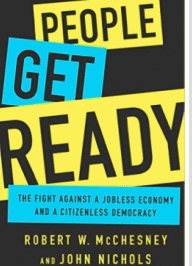I do agree that Hillary's time is now or never, and her scandals lead me to think "never" is an increasingly possible outcome. But feminism can thrive without Hillary winning. Either of the other Democratic candidates would in my view be as good--and in some cases arguably better--on the entire array of feminist issues. And if Hillary's scandals and general inability to appeal to the young voters she will need to win leads to a GOP victory in November, her flawed candidacy might set back women's rights for a good generation.

People Get Ready: The Fight Against a Jobless Economy and a Citizenless Democracy, by McChesney and John Nichols
(Image by Nation Books [March 6, 2016]) Details DMCA
JB: Thank you for your thoughtful response, Robert. There is much in what you say. But a GOP victory in November could also be nothing more than the aggregate of all the gerrymandering and wholesale voter suppression that the Republicans have been engaging in for years in state after state. Democrats have not made much of a stink about the disenfranchisement of potentially millions of voters, most likely Democratic ones, at that. I don't get it. Why do you think that is?
RM: This takes us far afield, and I will try to keep this answer short, and restrict my answer to the presidential race. Here gerrymandering is not a factor. Wholesale voter suppression, on the other hand, is a problem in several states, many of which could be decided by thin margins in 2016. Democrats have not done nearly enough to protect and expand voting rights and actual participation. They have grown accustomed to a world where just over 50 percent of the voting age population votes in presidential years, 35 percent in off-year congressional elections, and turnout usually runs 15-30 percent in other non-November elections. And the major donors to the Democratic Party seem comfortable with that as well. They are not clamoring to expand voter participation.
What we know is that voting skews heavily to older, whiter and wealthier segments of the population. This makes the electorate far more Republican than it would be otherwise. In 2010 and 2014 Republicans won massive landslides in the off-year Congressional elections after getting walloped in 2008 and 2012. But in neither 2010 or 2014 did Democrats switch en masse to Republicans. Instead younger and blacker and browner and poorer Democrats simply did not vote. Republicans get this and that is why they know voter suppression is job one.
As it is right now, the Republicans are looking at states like Texas and Arizona and realizing that if people of color voted at the same rate as whites, especially middle-class and above whites, those states would become purple and very soon would be as blue as California. In short, if the USA had a turnout rate of 65-70 percent of voting-age adults--which would still be below average for the world's major democracies--the existing Republican Party would never win a national election again and would quickly become a fringe party once the effects of gerrymandering ended after the 2020 census. The party would have to change its positions or it would likely collapse and be replaced.
The Democrats have shown little enthusiasm for expanding voter participation as well. In 1984, the Mondale campaign was trailing Reagan badly and commissioned a study to see if there was anything that could be done to make it possible for Mondale to win. The report concluded that the only way Mondale could win would be by raising the voter turnout from 50 percent to 60 percent, and having the new voters come for poor and working-class backgrounds. The problem was that the only way to get such people to vote would be to change the party platform and put an emphasis on redistribution and policies which served the poor. The party considered the report and the recommendations and elected to do nothing. It preferred to take its changes with the existing electorate rather than change the party to expand the voting base. A significant factor, as I recall, was the concern that changing the direction of the party in 1984 would alarm and disturb the party's major funders.
These are points of emphasis for Bernie Sanders, who argues that he can bring all sorts of new people into the political process because his program has great appeal to people who would otherwise not vote. Looking at the extraordinary levels of support he is getting from people under the age of 30--people who barely vote any longer--there seems to be merit in his approach.
To circle back to your point of departure, these new young voters are going to be critical for Democrats in 2016. It is why Hillary and Debbie Wasserman Schultz need to be very careful about antagonizing Bernie's followers by perceived rigging of the game; they cannot take these votes for granted, and the usual political bickering that dominates campaigns is a massive turn-off to these new voters. The sort of zingers that win applause inside the beltway and on cable TV news fall flat on their face with young and working-class voters.
(Note: You can view every article as one long page if you sign up as an Advocate Member, or higher).






